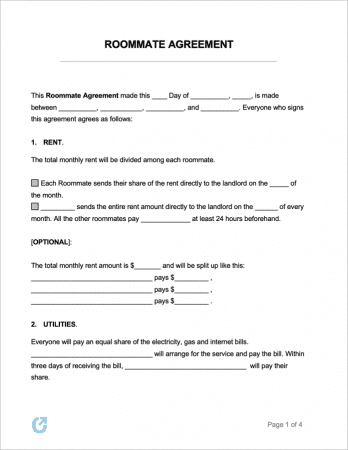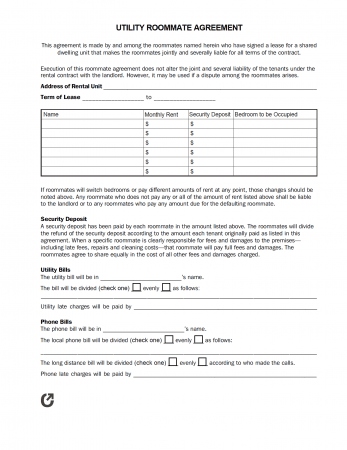
A roommate agreement template, also called a “roommate lease agreement”, is a document used for establishing a set of formal and informal rules that tenants sharing a rented apartment, home, or condominium agree to follow for the length of the lease.
It is mainly used to reduce the likelihood of disagreements forming over noise, guests, cleaning, utility payments, belongings, and similar topics. The mere act of discussing and completing a roommate agreement is often as important as the contract itself, as many roommates find it difficult to bring-up rules after the first few weeks or months of living together.
College (Dorm) Roommate Agreement – specifically designed for students sharing the same university dorm room or apartment.
The following states contain state-specific roommate agreements, which were designed to account for each state’s unique lease laws.

Standard Roommate Agreement – used for the majority of roommate living situations. Allows for the establishment of rules, quiet hours, cleaning schedules, guest policies, and much more.

Utility Roommate Agreement – a roommate agreement with sections that allow rules to be made regarding specific utilities such as internet, cable, security deposits, and general utility bills.
A roommate agreement is a document designed to promote structure and harmony within a shared living space. This agreement can be employed to establish guidelines on matters such as guests, chores, utilities, alcohol and drug use, and rent payments.
When roommates officially sign the document, outlining their responsibilities for rental payments and/or utilities, it can serve as a legally enforceable instrument.
It depends. If 1) the tenants signed and dated the agreement, and 2) the contract contains rules on rent payments and utilities, then the agreement can be legally binding. However, only conditions regarding money can be enforced by a court of law.
For example, if a roommate by the name of “Jimmy” keeps inviting his friends over at 1 AM to practice the drums, a court can’t force Jimmy to stop playing the drums or find better friends – that’s up to the roommates to resolve.
Yes, very much so. Leases structure every detail regarding a rental arrangement and bind the landlord and lessees to a set of conditions that, if broken, can follow severe consequences. Roommate agreements, while serious documents, only apply to the tenants themselves – the landlord does not have to know a roommate agreement even exists during the lease.
Generally, as much detail as possible should be included. Even if it is never referenced again, having as much agreed-upon beforehand can prevent future conflicts from escalating into more serious fights. If all the roommates are on the lease agreement signed with the landlord, including rent payments is not necessary. This also applies to utilities. However, if the original lease does not specify which roommate is to pay what, or it doesn’t say utilities and rent is to be split evenly, this should be included on the roommate agreement.